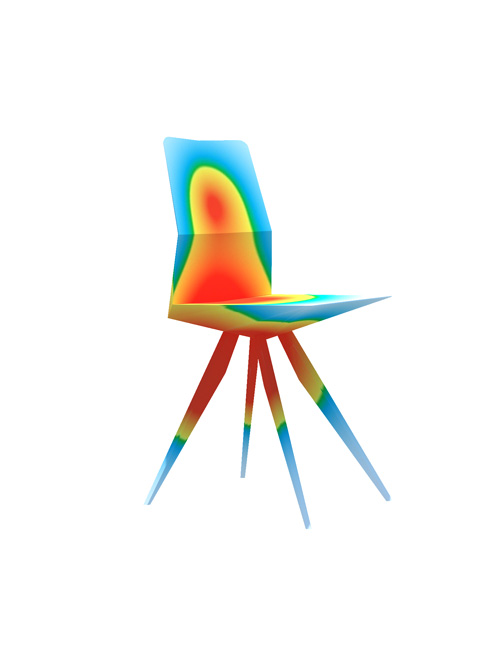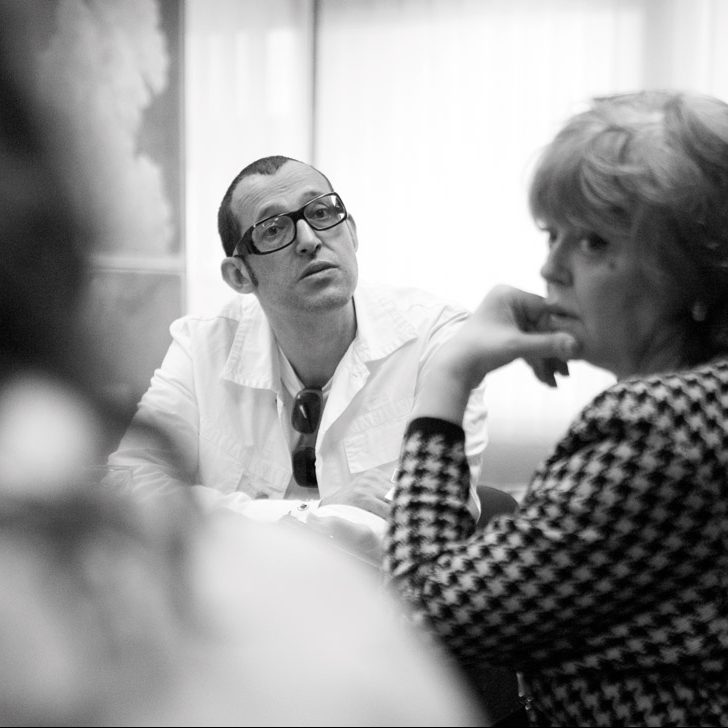
INTERVIEW WITH CLEMENS WEISSHAAR – B92 NEWS PORTAL
The designer Clemens Weisshaar was one of the speakers at this year’s Belgrade design Week, who made a great impression on the audience during the “innovation squared” conference, presenting his work on the Ultra Chair, produced with latest ultra- lightweight technology used for audi’s race car r18.
The studio Kram/Weisshaar basically applied the same technology to a piece of furniture, also using very advanced testing technologies. In Milan they put the chair to the test: 1500 people sat on it and tried it out, while the computers graphically showed and recorded the pressure on the chair depending on different weights and positions of the body. That way they got a big database which helps them to understand how people actually use this chair – working both from the engineering and the human viewpoint. “Seeing videos of 1500 people using a chair is quite interesting, quite amazing, and it gives you an insight into how people use furniture” says Weisshaar.
In some of your works (like “Hypersky”) you push the boundaries of design, science and technology, creating a new kind of environment, and also making an impact on human experience.
The installation „Hypersky“ in Cologne is a window to the world, a window to the sky, a little bit like the Oculus in Roman architecture, a ceiling opening. But it’s not a real, physical opening, it’s a digital surface that superimposes all phenomena in the sky, around the house, on top
of each other. So we layer and compile information gathered from sensors into a fresco of the XXI century, a real-time rendered fresco. That combines a lot of really interesting technologies into an installation that’s not interactive in a sense that humans interact with it, but it interacts based on the conditions around the house. What this installation does, interestingly, everybody who steps into that room and leaves the house afterwards, looks up to the sky. It supercharges your perception of everything that happens above you. You’re not aware that there are satellites flying above you, that the most incredible things happen in the atmosphere… the stars, the planets, all these things are always above us, but we totally lose the sense for these things because we just take it as a given and don’t think about them. This installation really hypercharges this perception, in a way, that’s also why it’s called „Hypersky“: because it’s a very enhanced version of the sky that we see.
What are the challenges designers face today?
Designers changed a lot over the last ten years. We are finding ourselves increasingly in a position where we have to make the things we design. We really have to produce our ideas, because some of them are so advanced technologically that there’s literally nobody to call and say „Can you make this“? So in many cases we actually end up really implementing, building, making these things. It doesn’t matter if it’s for Audi, or Prada, or for a private client. In many cases it’s the only way you can make these works where many technologies are combined into a single unit, into a body of work. You just have to go that way: you have to be a scientist, a designer, an architect, you have to communicate… you can’t pick one of those professions, because that would limit your work incredibly. You have to have a much broader scope… For instance, in our offices we don’t employ designers and architects, really, but everybody else. They are typically the people who have the most interesting things to say about design and architecture, which are our core activities, obviously.
What does it take to be innovative?
There are two ways: either you just want to impress girls, or you just put yourself under pressure. The key ingredient is pressure – without pressure, there’s no innovation. If there’s no need for innovation, it’s not gonna happen. And that also leads to this horrible phenomenon that in war times there’s this boost of technological innovation, in the most horrible condition mankind can be in. But I think we don’t need war anymore, because the world is in a mega-crisis anyway, it’s an almost constant mega-crisis, so there’s enormous space for innovation, also because the established systems have failed, they don’t work anymore, we have XIX century institutions dealing with XXI century problems, and the only way through that is to brutally, radically rethink everything. I think that should be
the scope: if you radically rethink everything, you will automatically innovate.
Innovation used to be about individual technology. The light bulb, Mr. Edison designs a light bulb, and the lights turn on. Or, Mr. Otto designs the diesel engine, and in each case it’s “A-level” technology – it’s THE diesel engine, it’s THE light bulb, whereas now innovation doesn’t happen like that. There are no more Nikola Tesla’s… innovation happens in a much more networked way – and I am using that word very carefully, because I don’t really like it – it’s such a buzz word, everybody is networking, networking, networking… What I mean by it, is that you have a variety of ingredients, one of them may be software, the other may be hardware, and that’s other people’s intellectual property too, because if you use the computer, every chip has been designed by someone else, and only the combination of all these people (designing little memory chips, drivers, software…) all of that together becomes a computer. Automatically, as soon as the computer is involved, we’re talking about an enormous amount of intellectual property that’s concentrated in one place. All XXI century innovations, without exceptions, are combinations of different technologies, so it’s much more about plugging things together now, than sitting down in the bathroom and thinking of the next big thing. The next big thing can be something quite discreet, something quite small.
Trackback from your site.





